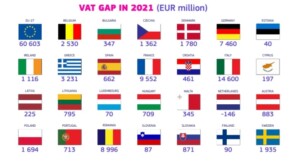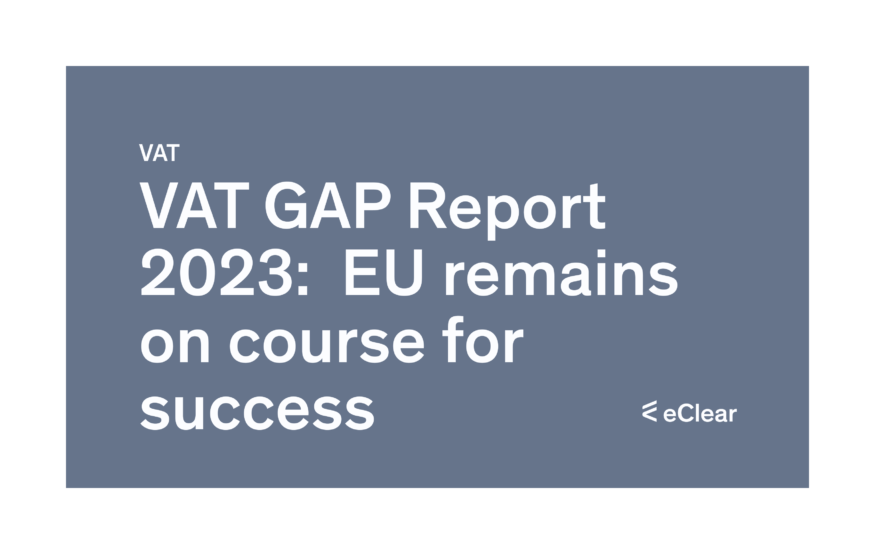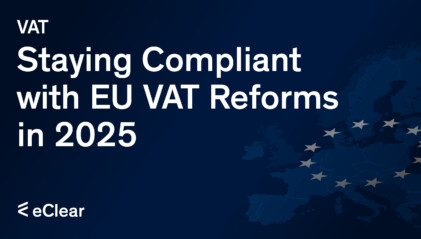The European Commission’s latest “VAT Gap Report 2023” highlights a significant reduction in the VAT gap within the EU for 2021, a trend that has been consistently positive since 2013. This article delves into the driving forces behind this noteworthy development, the tangible impact of recent initiatives, and the promising expectations for the future.
What is the VAT gap all about?
The VAT gap, also known as the VAT compliance gap, measures the discrepancy between the VAT revenue that could theoretically be collected and the VAT revenue actually collected. This gap, expressed in absolute figures or per cent, illustrates the extent of uncollected VAT. There can be many reasons for this, such as VAT fraud, optimisation practices, bankruptcy, or administrative errors.
According to the report of 24 October 2023, the EU-wide VAT gap fell from around 99 billion euros in 2020 to about 61 billion euros in 2021, a massive decrease of 39 billion euros. Italy, Poland, and Belgium recorded particularly striking declines. But what factors are contributing to this trend?
![]()
The report reveals that VAT revenues and the expected VAT Total Tax Liability (VTTL) rebounded in 2021, surpassing pre-crisis levels. The VAT gap narrowed in almost all EU member states. The COVID-19 pandemic, which made tax payments a prerequisite for support services, played a significant role in this trend. Additionally, a shift in consumption habits towards better-regulated areas such as online commerce and various administrative reforms, including new monitoring technologies, have also contributed to narrowing the gap.
The VAT gap is also expected to narrow as new EU VAT initiatives, “ VAT in the Digital Age”, come into force, tackling fraud and simplifying administration.

New developments in EU VAT
VAT fraud has fallen significantly since the introduction of the VAT package for e-commerce in 2021. This package included the abolition of the VAT exemption for low-value parcels and the introduction of the One-Stop-Shop (OSS) mechanism, which simplifies VAT reporting and payment for B2C services and distance selling of goods. The Import-One-Stop-Shop (IOSS) for low-value parcels and special regulations for non-IOSS use have also been introduced.
Local measures, such as introducing the Standard Audit File for Tax and the split payment mechanism in Poland, also contributed to reducing the VAT gap. From July 2024, the exclusive issuance of invoices via the national e-invoicing system will be mandatory in Poland, further improving VAT compliance.
In 2022, Operation Admiral, a cooperation between the European Public Prosecutor’s Office and law enforcement authorities from 14 EU Member States, uncovered a VAT carousel fraud worth 2.2 billion euros. This operation was made possible by technologies that facilitated data exchange between the authorities involved.
DAC 7 and CESOP on the rise
In addition, “DAC7” and “CESOP” were developed to combat fraud and close the VAT gap. DAC7, the seventh directive on administrative cooperation in taxation, came into force in 2023 and introduced reporting obligations for digital platform operators.
CESOP, the Common European Solution for Online Platforms, plays a pivotal role in enhancing the transparency of cross-border online trade, thereby significantly bolstering the EU’s efforts to combat VAT fraud. These initiatives underscore the EU’s unwavering determination to close the VAT gap through legislative measures, technological advancements, and enhanced international cooperation.
Outlook
The successes to date are impressive, no question. However, 2024 will undoubtedly present us with real challenges, especially in fiscal terms: The Karlsruhe ruling on the 2021 supplementary budget reveals future financial holes in the federal budget — the expected additional revenue from the reduced VAT gap is at least cause for optimism.
It is crucial to reiterate that continuous and concerted efforts are imperative to combat VAT fraud and avoidance. The EU remains steadfast in its support to member states, ensuring the effective implementation of new regulations and the utilisation of state-of-the-art technologies within a robust network.




